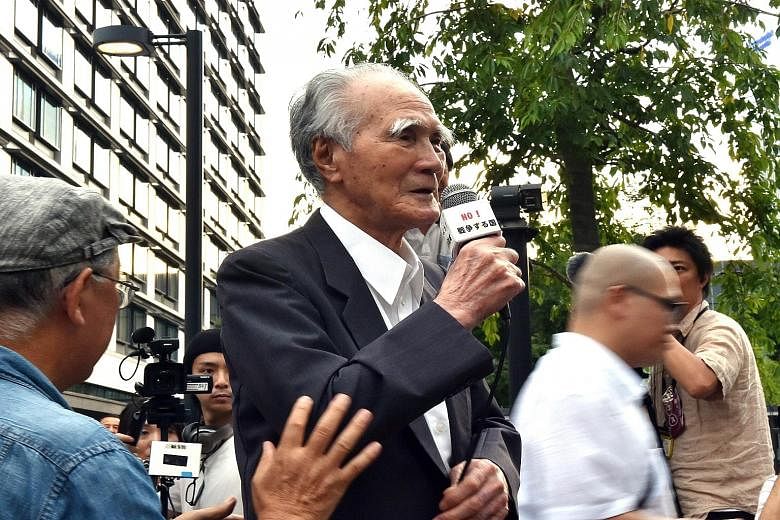TOKYO • Former Japanese prime minister Tomiichi Murayama yesterday addressed several hundred protesters on a street near the Diet building, to oppose a series of controversial security Bills pushed forward by the government.
Mr Murayama, 91, said Japan's Constitution protected the country from getting involved in any armed conflict in the past 70 years following the end of World War II.
He criticised Prime Minister Shinzo Abe's government for pushing the new security Bills, saying that they would damage the country's pacifism.
In 1995, Mr Murayama made a landmark apology - known as the Murayama Statement - for the wartime damage and suffering caused by Japan.
The new Bills, passed by the all-powerful Lower House last week, would allow Japan to exercise its right of collective self- defence, or to defend a friendly country under attack.
Mr Abe says the legislation, which would also expand the scope for Japan's military to provide logistics support to friendly countries and participate in peace-keeping operations, is vital to meet new challenges, such as from an assertive China.
Mr Abe's Liberal Democratic Party-led coalition voted in favour of the legislation despite huge public demonstrations. The main opposition parties had also walked out of the chamber in protest on the day of the vote.
Mr Murayama said ramming the Bills through the Lower House despite public opposition was "intolerable". He also said the government's "arrogance was unforgivable" and that he would make every effort to stop the passage of the Bills in the future.
Latest polls showed that the majority of Japanese people opposed the security Bills and support for Mr Abe dived about 10 percentage points immediately after the Bills' passage in the Lower House.
Meanwhile, China's ambassador to Japan yesterday called on Mr Abe to clearly express remorse for his nation's World War II actions or risk "rubbing salt in the wounds" of those who suffered.
Ties between the Asian neighbours have long been fraught due to China's memories of Japan's wartime aggression, but relations improved following meetings between Mr Abe and Chinese President Xi Jinping over the last year.
Japanese government sources say another summit could take place this year.
But some also say China first wants to see a planned statement by Mr Abe marking the 70th anniversary of the war's end, amid concerns he may dilute past government apologies.
Mr Cheng Yonghua, China's ambassador to Japan, warned Japan not to backtrack on previous government statements and said China was keenly waiting, particularly to see if Mr Abe expressed remorse towards those who suffered from Japan's actions. "If the statement is deliberately made vague, or if it lightens responsibility, it will once again rip open the wounds of China and the other victims, and rub salt in them," Mr Cheng told a news conference in Tokyo.
Mr Abe has repeatedly said he will express remorse in the statement, expected out shortly before the Aug 15 anniversary of the war's end, but that he will not issue a fresh apology - despite a recent poll by Kyodo news agency that found 67 per cent of respondents saying that he should.
XINHUA, REUTERS

